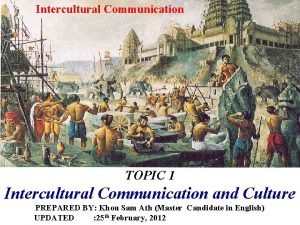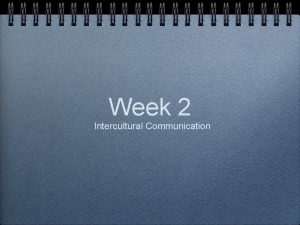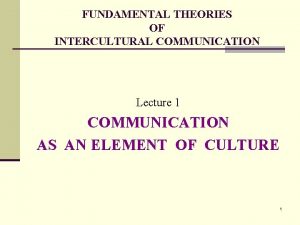Intercultural Communication Japan Overview Stratovolcanic archipelago Littoral areas















- Slides: 15

Intercultural Communication Japan

Overview ● Stratovolcanic archipelago ● Littoral areas with high population densities ● World's tenth largest population: 126 million ● 9. 1 million people live in Tokyo ● Constitutional monarchy and an elected legislature

Dimensions of the Japanese Culture ● High-context culture ● Collectivism ● Time orientation ● High power distance ● Communication Style

Basic Etiquette - Appearance and Dress ● Dress formally ● Dark clothes - black or dark blue ● Shoes that are easy to put on and remove ● For men: conservative and well put together business suit ● For women: dress conservatively also

Basic Etiquette - Greeting ● Most important piece of Japanese body language ● Lower and longer duration of the bow = higher degree of respect ● Bows are different for male and female

Basic Etiquette - Body Language ● Eye contact - rude, sign of aggression ● Counting with fingers

● Angry ● Money ● OK ● Referring to yourself

Basic Etiquette - Gift Giving ● Omiyage (Souvenir) ● Temiyage (Thank-you Gifts ) ● Ochugen (June Gift Giving) ● Oseibo (December Gift Giving)

Basic Etiquette - Dining Etiquette ● Cushions on Tatami Floors ● Chopsticks ● Eating

Business Etiquette - Attitude Towards Business Japan remains stubbornly Japanese Traditional culture Emphasis on hierarchy Be respectful

Business Etiquette - Attitude Towards Conflict ● Indirect Approach ● Use of Intermediaries ● Focus on the Negative

Business Etiquette - Typical Business Day • • • begins from 8: 30 am-9: 00 AM work until noon, then grab lunch meet with friends, then return grab a meal around 6: 00 PM return to work until they leave sometimes they spend the night

Business Etiquette - Decision Making ● ringi-sho: report ● ringi-seido: “bottom-up”, consensus process ● whole group shares responsibilities Junior-Level employee Senior-Level Employee Member of the Board

Video ●https: //www. youtube. com/watch? v=sjkf 3 z. AY 3 q. Y

Work Cited • Kumayama, Akihisa. "Understanding Gift Giving in Japan. " The International Executive, 31. 4 (1990): 19 -21. • Brenner, Leslie, and Michalene Busico. "JAPAN; a Few Insider Tips for Navigating the Dining Scene; Gaining Entry to Tokyo's and Kyoto's Top Restaurants -- and Having the Best Experience Possible Once You're There -- is Trickier Than It Might Seem. Here's How to Get the Reservation, How to Find the Place, How to Order, What to Do if You Need to Cancel and a Brief Guide to Etiquette: HOME EDITION. " Los Angeles Times, (2007): L. 8. • Oikawa, Naoko, and John F Jr Tanner. "The Influence of Japanese Culture on Business Relationships. " The Journal of Business & Industrial Marketing, 7. 4 (1992): 55. • Dean, Peter J. "International Business in Japan: Learning a Cultural Underpinning for the Japanese. " Performance Improvement Quarterly, 13. 1 (2000): 3 -6. • "Decision-Making, the Japanese Way. " Decision-Making, the Japanese Way. Web. 28 Oct. 2015. • Anonymous, . "The Bend, the Bow and the Kowtow: Body Language in Japan. " The Economist (Online), (2010)
 Ringi seido
Ringi seido Intercultural communication barrier
Intercultural communication barrier Example of a low context culture
Example of a low context culture Intercultural communication questions
Intercultural communication questions Avowal intercultural communication
Avowal intercultural communication Intercultural communication meaning
Intercultural communication meaning Intercultural communication notes
Intercultural communication notes Staircase model of intercultural communication
Staircase model of intercultural communication Example of verbal intercultural communication
Example of verbal intercultural communication Nonverbal communication codes
Nonverbal communication codes Intercultural communication conclusion
Intercultural communication conclusion Ethnocentrism intercultural communication
Ethnocentrism intercultural communication Intercultural communication model
Intercultural communication model Technology and intercultural communication
Technology and intercultural communication Theories of intercultural communication
Theories of intercultural communication Strategies for improving intercultural communication
Strategies for improving intercultural communication


























